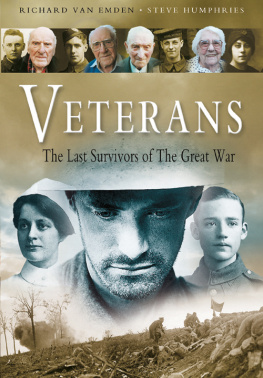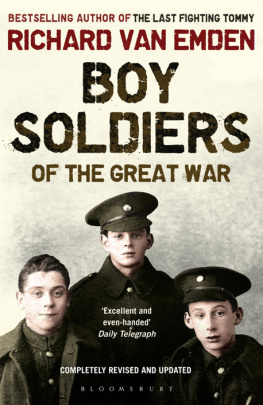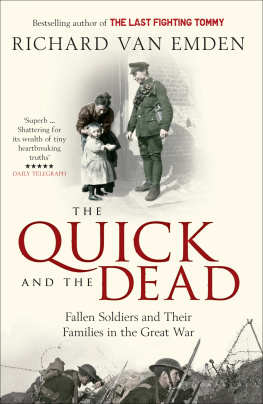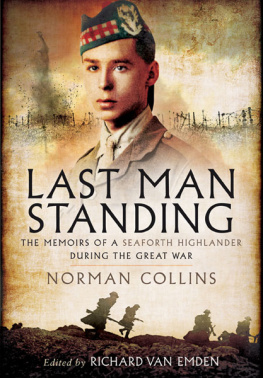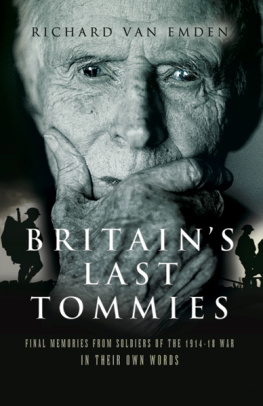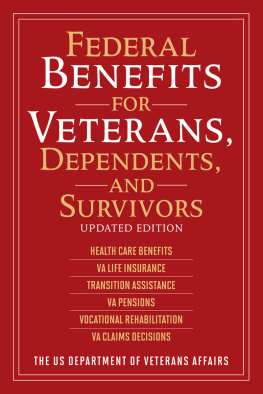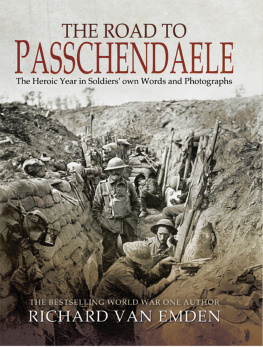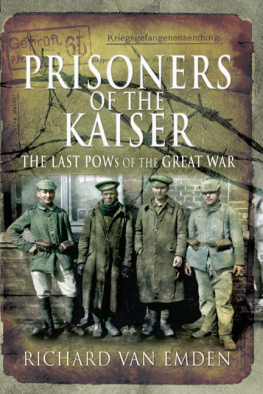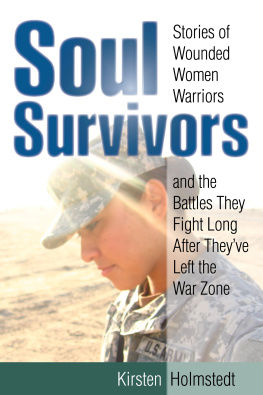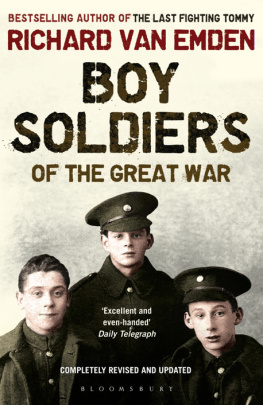Richard van Emden - Veterans: The Last Survivors of the Great War
Here you can read online Richard van Emden - Veterans: The Last Survivors of the Great War full text of the book (entire story) in english for free. Download pdf and epub, get meaning, cover and reviews about this ebook. year: 1998, publisher: Pen and Sword, genre: History. Description of the work, (preface) as well as reviews are available. Best literature library LitArk.com created for fans of good reading and offers a wide selection of genres:
Romance novel
Science fiction
Adventure
Detective
Science
History
Home and family
Prose
Art
Politics
Computer
Non-fiction
Religion
Business
Children
Humor
Choose a favorite category and find really read worthwhile books. Enjoy immersion in the world of imagination, feel the emotions of the characters or learn something new for yourself, make an fascinating discovery.
- Book:Veterans: The Last Survivors of the Great War
- Author:
- Publisher:Pen and Sword
- Genre:
- Year:1998
- Rating:4 / 5
- Favourites:Add to favourites
- Your mark:
- 80
- 1
- 2
- 3
- 4
- 5
Veterans: The Last Survivors of the Great War: summary, description and annotation
We offer to read an annotation, description, summary or preface (depends on what the author of the book "Veterans: The Last Survivors of the Great War" wrote himself). If you haven't found the necessary information about the book — write in the comments, we will try to find it.
Veterans: The Last Survivors of the Great War — read online for free the complete book (whole text) full work
Below is the text of the book, divided by pages. System saving the place of the last page read, allows you to conveniently read the book "Veterans: The Last Survivors of the Great War" online for free, without having to search again every time where you left off. Put a bookmark, and you can go to the page where you finished reading at any time.
Font size:
Interval:
Bookmark:
Dedicated to Harry Patch, aged 107, former
private in the 7th Duke of Cornwall's Light
Infantry, and to the memory of the Lewis Gun
team he lost, 22nd September 1917.
Other books by Richard van Emden
Britain's Last Tommies
Boy Soldiers of the Great War
All Quiet on the Home Front
Last Man Standing
The Trench
Prisoners of the Kaiser
Tickled to Death to Go

First published in Great Britain in 1998 by
LEO COOPER
An imprint of
Pen & Sword Books Ltd
Published in this format in 2005 by
Pen & Sword Military
An imprint of
Pen & Sword Books Ltd
47 Church Street
Barnsley
South Yorkshire
S70 2AS
Copyright Richard van Emden and Steve Humphries, 1998, 2005
ISBN 1 84415 319 3
ISBN 9781848845619 (epub)
ISBN 9781848845602 (prc)
The right of Richard van Emden and Steve Humphries to be identified as Authors
of this work has been asserted by them in accordance with the Copyright, Designs
and Patents Act 1988.
A CIP catalogue record for this book is
available from the British Library
All rights reserved. No part of this book may be reproduced or transmitted in any
form or by any means, electronic or mechanical including photocopying, recording
or by any information storage and retrieval system, without permission
rom the Publisher in writing.
Printed and bound in England
By CPI UK
Pen & Sword Books Ltd incorporates the Imprints of Pen & Sword Aviation,
Pen & Sword Maritime, Pen & Sword Military, Wharncliffe Local history,
Pen & Sword Select, Pen & Sword Military Classics and Leo Cooper.
For a complete list of Pen & Sword titles please contact
PEN & SWORD BOOKS LIMITED
47 Church Street, Barnsley, South Yorkshire, S70 2AS, England
E-mail:
Website: www.pen-and-sword.co.uk
We would like to thank all the people who have helped us in writing this book, with especial thanks to Michael Jackson, Alan Yentob, Peter Salmon and Sam Organ for supporting the BBC1 programmes on which this book is based.
We are also grateful to other members of the Testimony Films team, particularly Andy Attenburrow and Mary Parsons, for excellent additional research and editorial help. Thanks are also due to Miriam Akhtar, Lucy Swingler, Hilary Jelbert, Madge Reed, Mike Humphries, Steve Hasket and Mike Pharey, the cameramen, and the sound recordist, Jeff John.
We would like to thank Roni Wilkinson for his enthusiastic perseverance in turning around this book in such a short space of time, and Henry Wilson and Charles Hewitt for their support. We would also like to thank Joan and Wolfgang van Emden for their help in editing and proof-reading each chapter of this book even on holiday!
For their support and advice, we are grateful to Peter Barton, Dennis Goodwin, Jonathan Hupfield and David Bilton.
Lastly, and most importantly, we wish to thank all the contributors to this project, the men and the women whose vivid memories from over eighty years ago have enabled us to write a book which we hope is a fitting tribute to their courage and endeavour. We would also like to make special mention of those veterans who were filmed for the BBC1 documentary, but whose invaluable stories do not appear in this book: Bill Cotgrove, Dick Trafford, William Lunn, Smiler Marshall, Alfred Wood, Jack Davis, Tom Brennan, Alfred Henn, Sydney James, Harold Judd, William Hall, and Allen Short.
The authors and publisher would like to acknowledge the following for their permission to reproduce the photographs.
The Imperial War Museum, London
The Taylor Library, Barnsley
The Tank Museum, Bovington
T HE GREAT WAR, one of the most catastrophic and traumatic wars in human history, will very soon be beyond living memory. It is now eighty years since it ended. This book and the BBC television programmes it accompanies were commissioned to commemorate the eightieth anniversary of its ending. it seemed that this was the last chance to tell the story of the First World War through the first person testimony of the men and women who experienced it and whose lives were shaped by it. The aim was to retrieve the memories of the tiny and dwindling band of survivors from the heady days of 1914 and 1915 when two and a half million young men volunteered to serve King and Country. In the following years, they would face the shocking reality of modern, industrial warfare, witnessing the deaths of many close friends and comrades. More than a million servicemen from Britain and her Commonwealth and Empire would die on active service. Two million more would be injured or maimed. How these men, some as young as sixteen or seventeen, coped with this maelstrom and then lived with the memory is, for later generations, a source of abiding fascination and respect.
As well as documenting the men's experiences, we also wanted to record the memories of the women, some of whom served alongside them. They too played an important and often forgotten role in the war. We wanted to hear from the nurses who tended the soldiers' injuries, the canary girls who risked their lives making shells in the munitions factories, the wives and sweethearts who lived in terror of the telegram boy, and the daughters, still in school, who would never see their father again.
How much would these men and women, in their late nineties and early hundreds, actually remember? Would the historical detail and drama they lived through still be fresh? Would the emotional hurt still remain? How did it feel to look back across eighty years at such a cataclysmic event? How did they cope with the loss and sacrifice suffered by so many? These were just a few of the many questions we asked.
But to start with, there was the daunting challenge of finding the people to talk to. The men and women of the First World War form a kind of lost community. There were probably around 4,000 men still alive who fought, perhaps 200 nurses who worked behind the lines, maybe 1,000 munitions workers. A tiny handful of the most active veterans still attend the Cenotaph each year and return to the Western Front to remember their fallen friends every summer and autumn. These were relatively easy to contact through the ever helpful veterans Associations, such as the World War One Veterans Association and the Western Front Association, which organised reunions and activities. However, most veterans had completely lost touch with their old comrades and had no contact with any First World War organisation. This isolation and anonymity is even more pronounced with women who served and worked in the war. A few organisations like the Red Cross and Queen Alexandra's Nursing Sisters had until recently kept in touch with a handful of elderly nurses, but apart from this nobody knew how many were still alive, where they were or what their stories might be.
In trying to track down the survivors of this ancient, lost community, it has been my enormous good fortune to work with Richard van Emden. When I first met Richard around four years ago, he astounded me by claiming to have been in personal contact with one hundred and twenty First World War veterans. He had been obsessively collecting them, almost like a vanishing species, tape-recording their memories and photographing them for over ten years. A few of these old soldiers were interviewed again and filmed for our project. But a contact book bristling with centenarians can within two or three years dwindle to almost nothing, and sadly before Veterans had got under way, many of Richard's veterans had died or were too ill to be interviewed.
Next pageFont size:
Interval:
Bookmark:
Similar books «Veterans: The Last Survivors of the Great War»
Look at similar books to Veterans: The Last Survivors of the Great War. We have selected literature similar in name and meaning in the hope of providing readers with more options to find new, interesting, not yet read works.
Discussion, reviews of the book Veterans: The Last Survivors of the Great War and just readers' own opinions. Leave your comments, write what you think about the work, its meaning or the main characters. Specify what exactly you liked and what you didn't like, and why you think so.

